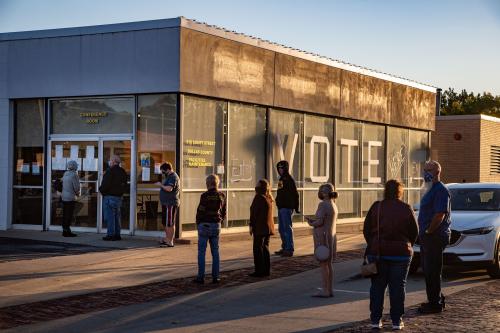Demographic shifts are clearly important in elections, but nowhere will that be more true in this election than in the battleground states of Florida and Arizona, where the share of Latino voters is 21% and 24% respectively. Latino voters are a diverse group, both in terms of their community identities and the issues that are of greatest concern to them. And while both the Trump and Biden campaigns have made attempts to appeal to different slices of the Latino electorate, it is clear that if either party is seeking to expand its base of support in future elections, both Democrats and Republicans will have to invest more heavily in understanding and responding to the diversity among Latino voters.
A look at Latino voters in Florida and Arizona illustrates how important this will be in future election cycles. It is well-known that there is a significant Latino electorate in Florida. While we normally think of Cuban Americans as the primary Latino constituency in Florida, the picture is more complex politically. Cuban Americans, concentrated in Miami-Dade County, account for 29% of the Latino electorate in Florida while Puerto Ricans, concentrated in Central Florida, account for 27% of the Latino electorate in the state.
From a political perspective, these are two very different groups. Although the support for the Republican party has been softening among younger Cuban Americans in Florida, Cuban Americans are usually reliable supporters of the Republican Party. Puerto Ricans, on the other hand, are more likely to be Democrats. Cuban Americans in Florida are well integrated in civic life in Florida; Puerto Ricans far less so.
The difference between the two groups is further reflected in the issues that are top of mind for each of these voting blocs in this election. Among Cuban American voters in Florida, the top three issues for this election cycle are the economy, health care, and violent crime. For Puerto Rican voters in Florida, the top three issues in the 2020 campaign are the coronavirus, discrimination against Latinos and immigrants, and job creation.
In this election cycle, Democrats have an opportunity to attract additional voters in constituencies that rank coronavirus as a top issue. Puerto Rican voters in Florida could therefore be important to the final outcome at the top of the ticket. Accordingly, the Biden campaign has recently spent more time and effort courting Florida’s Puerto Rican voters. However, this has been a last hour tactic; in subsequent elections, that effort will have to be a more integral part of campaign strategies for Florida from the start of a campaign season in order to reliably sustain the interest of Puerto Rican voters.
In contrast to the canvas of Latino constituencies in Florida, Latino voters in Arizona are more commonly of Mexican heritage and more likely to have had a recent experience with immigration to the United States. They are also more likely to be politically involved, especially if they are young. According to a recent Univision poll, the most pressing issues in the 2020 election for Latinos in Arizona are coronavirus, wages/income, and healthcare – again underscoring the diversity in issue concerns among Latino electorates more broadly.
For the first time this year, the Democratic party invested in Latino voter turnout in Arizona, indicating the emergence of a more sophisticated strategy for electoral success among Latinos in the state. This seems to have paid off: in a recent poll, 64% of the Arizona Latinos surveyed responded that they would vote for Biden on November 3rd and looking down ballot, a similar percentage (65%) said that they would vote for Mark Kelly (D) in the Senate race against incumbent Martha McSally (R).
The Latino constituencies in both Arizona and Florida will be crucial to the outcome of the national election. In the aftermath of the 2020 elections, regardless of the result, any political party that wants to expand its base will have to spend time and money in understanding how different experiences within Latino communities shape their preferences. This will be true for the bread and butter issues of jobs, healthcare, and taxes, but it will also be important as the President-elect wades into the national conversation on race. A recent Nationscape survey found that when Latinos were asked about how much discrimination there was in the U.S. against Blacks, 80% of the Latino respondents who identified as Black, said there was a lot of discrimination, while only 47% of those who identified as white said the same. The responses to this question also varied by age group with 66% of young Latinos saying there was a lot of discrimination, which was significantly more than the 45% of the middle aged and 41% of older Latinos who responded similarly.
Latino voters are diverse and increasingly important. Political parties would do well to throw out the old playbook and embrace the Latino community with a nuanced understanding of the different constituencies of voters whose families originally came from Spanish-speaking parts of the world. You never know – a close election could turn on that decision.







Commentary
The importance of understanding Latino voters in battleground states
November 3, 2020